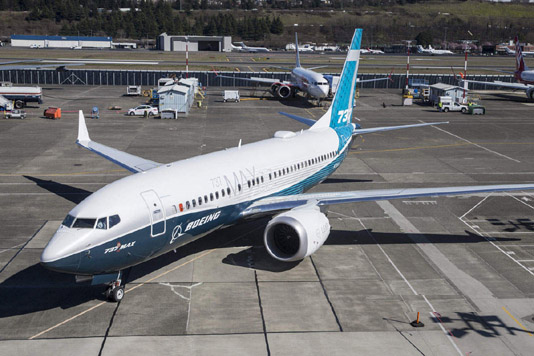NEW DELHI, Mar 14, 2019 (BSS) – Air fares in India have shot up at 40-50%
with some sectors recording as much as a 100% spike in last minute ticket
prices following ban on flying Boeing 737 MAX 8 in Indian airspace.
“The immediate trigger for the problem, which is expected to worsen as
school holidays begin next month, was the grounding of 13 SpiceJet Boeing 737
MAX 8 aircraft,” the vernacular Indian daily Hindustan Times reported today.
The Director General of Civil Aviation (DGCA) has imposed ban on flying
of Boeing 737 MAX 8 aircraft in the Indian airspace from yesterday following
fatal crash of such type of aircraft of an Ehiopian Airlines on Sunday
killing 157 people on board.
“Tomorrow is going to be a real challenging day because today
[Wednesday] the ban has come into effect only from the second half of the
day,” the daily quoted Civil Aviation Secretary PS Kharola as saying.
Kharola said SpiceJet has assured him that they have taken up multiple
plans that include increase of the utilisation of existing aircraft so that
the cancellations get limited.
IndiGo, the country’s leading domestic airline by market share, in mid-
February announced that it will be cancelling 30 flights a day till March 31
due to a shortage of pilots.
Jet Airways, the second largest airline by market share, is reeling from
a liquidity crunch that forced it to ground 50 jets, which translate to at
least 100 flights.
Air India, which has the third-highest market share, has grounded 17
aircraft for technical reasons such as non-availability of spare parts,
according to DGCA data.
The average increase in same-day fares is 40-50%, while last-minute fare
from Delhi and Mumbai noticed a significant increase, which in some cases has
even been 100%, according to Aloke Bajpai, CEO and co-founder of Ixigo, a
travel booking website.
“At least 50 planes are out of action or grounded on the domestic front
owing to multiple reasons. That is a significant reduction in domestic
airline capacity. The additional capacity coming in is not likely to cover
this in the short term, while demand is going to be robust over the next few
months because of the school holidays season and surging leisure travel,”
said Sharat Dhall, chief operating officer (COO) of travel search engine
Yatra.com.
“The shortage of planes and high seat occupancies are expected to push
airfares north in the short term. The airfares were at least 15% higher this
year compared to last year, and owing to the current situation, airfares are
expected to rise further this season,” Dhall told the daily.
It is unclear how long the problem will last, especially since the most
immediate trigger has been the second crash of a new Boeing 737 MAX 8
aircraft in five months, which has led dozens of countries, including
European Union nations, to ban its operations.
The crisis has also hit international flights. “Following the ban of
Boeing 737 MAX in Indian airspace, international inbound flights have been
affected: 34 international flights into Mumbai and 12 flights bound for Delhi
were cancelled.
Grounding of additional planes will further impact fares which were
already high this season,” the Ixigo CEO said.
International flights on some sectors, particularly those headed to the
United States and Gulf nations, have also been affected by Pakistan’s
decision to close its airspace following a military confrontation with India
last month.
The government on Wednesday urged airlines not to increase fares, but
airlines are not under any legal obligation to do so since pricing is not
regulated.
Mark Martin, CEO of Dubai-based Martin Consulting, said Indian aviation
was possibly going through its worst phase. “Overall fleet of Indian carriers
is down by 20% due to multiple reasons. It will certainly have an impact on
fare,” he said.



